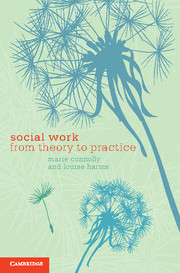Book contents
- Frontmatter
- Contents
- List of figures
- Preface
- Acknowledgements
- 1 Social work knowledge, theory and practice
- 2 Frameworks, models and practice
- 3 Ecosystems theories
- 4 Onion-peeling theories
- 5 Faulty-engine theories
- 6 Story-Telling Theories
- 7 Mountain-moving theories
- 8 Reflective practice and theory
- Concluding thoughts
- References
- Index
- References
5 - Faulty-engine theories
- Frontmatter
- Contents
- List of figures
- Preface
- Acknowledgements
- 1 Social work knowledge, theory and practice
- 2 Frameworks, models and practice
- 3 Ecosystems theories
- 4 Onion-peeling theories
- 5 Faulty-engine theories
- 6 Story-Telling Theories
- 7 Mountain-moving theories
- 8 Reflective practice and theory
- Concluding thoughts
- References
- Index
- References
Summary
IN OUR LAST CHAPTER our onion-peeling theories focused primarily on insight as the key mechanism for change. It was frustration with this insight focus that created the impetus for the development of more action-focused theories, in particular behaviourism and cognitive-behavioural responses. These relatively new theories, which we have grouped together using the ‘faulty-engine’ metaphor, brought with them ideas and techniques that would shift practice attention to the present and more concrete evidence of change. In many ways our ‘faulty engine’ metaphorical distinction is a bit unfair when describing behavioural and cognitive behavioural theories, although they have received critical appraisal for their perceived mechanistic, almost uncaring characteristics (Trevithick 2005); something to which we return later in the chapter. They do tend to be more structured and directive than other theories, and they do focus on actively changing thoughts and behaviour in the here and now. But there is no reason whatsoever why they can't be as engaging, respectful and empowering as any other theory when interpreted through a social work lens. We will start by looking at behavioural approaches.
BEHAVIOURAL APPROACHES
As we have noted, approaches based on the modification of behaviour largely emerged in response to a general sense of frustration with psychoanalytic approaches that delved into the past, focused on insight and a hope that greater awareness would actually change things for the better. During the 1970s psychodynamic approaches increasingly came under fire from a strengthening radical social work movement, which saw the micro focus on individual pathology as deeply discriminatory and failing to address issues of social justice and empowerment (Howe 2009). From another camp entirely, social workers with an inclination for science were questioning the effectiveness of psychoanalytic approaches that seemed to go on forever in what they perceived as some kind of confused morass. Social work was an applied science:
Like all good applied sciences, social work should be rational. Its techniques, when applied, should bring about the desired change. If social work is about helping people to cope better and change their behaviour, it seemed logical to suggest that social workers should have a good look at behaviour modification and its techniques for inspiration. And this is what happened.
(Howe, 2009: 49)- Type
- Chapter
- Information
- Social WorkFrom Theory to Practice, pp. 101 - 123Publisher: Cambridge University PressPrint publication year: 2011



